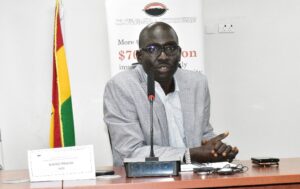Let’s build a culture of cyber awareness – ACBF

The African Capacity Foundation (ACBF) has called on African countries to build a culture of cyber awareness as the landscape of cyber risks keep changing.
Speaking on behalf of the Executive Secretary of the ACBF, Mamadou Biteye, at the opening of the Global Conference on Cyber Capacity Building in the Ghanaian capital, Accra, Wednesday November 29, 2023, Mr. Nbacke Niang, who is head of ACBF’s West and Central Africa Regional Office and Director of Programmes and Impact said, looking ahead, the ACBF believes that the gathered community of cyber experts should strive for several future endeavors.
“Firstly, we must emphasize the importance of continuous learning and adaptation in the face of evolving cyber threats. The landscape of cyber risks is ever-changing, and our responses must be agile and proactive. Building a culture of cyber awareness, promoting research and development, and investing in cutting-edge technologies should be at the forefront of our efforts,” he said.
Describing Africa’s potential in the digital space as vast, he said, “with the right knowledge, skills, and infrastructure, we can harness it for the benefit of our societies, economies, and the well-being of our people. As a continent, Agenda 2063 recognizes Cyber Security as a flagship programme which is a clear indication that Africa needs to not only incorporate in its development plans the rapid changes brought about by emerging technologies, but also to ensure that these technologies are used for the benefit of African individuals, institutions, or countries by ensuring data protection and safety online.”
He indicated that the ACBF recognizes the paramount importance of cyber resilience in the context of development, and therefore, the Foundation’s Strategic Plan 2023-2027 prioritizes digitalization as a cross-cutting issue given its ability to disrupt and transform African economies and societies.
“It drives entrepreneurial innovation, productivity, and economic growth. It also has implications for the labor market and political participation. The continent’s digital transformation is accelerating, bolstered by the increasing access to broadband connectivity. Governments, public institutions, the private sector, and development organizations are increasingly using digital tools and platforms to improve lives and fuel economic growth across the continent,” he said.
According to Mr Niang, in an increasingly interconnected and digitized world, the potential for cyber threats and vulnerabilities has grown exponentially.
“These threats pose significant risks to our economies, institutions, and societies at large. Yet, most of African countries have not ratified the Malabo Convention on Cyber Security and Personal Data Protection. So far, eleven Member States out of the required 15 have ratified the Malabo Convention. It is therefore imperative that we enhance our cyber capacity-building efforts to navigate the intricate challenges posed by the digital realm and ensure sustainable development,” he said.
Mr Niang also called for strong partnerships and collaboration among governments, international organizations, civil society, academia, and the private sector, acknowledging that no single entity can address the complex challenges of cyber resilience alone.
“By leveraging the collective expertise and resources of all stakeholders, we can forge comprehensive and effective solutions,” he said.
He also said the ACBF is happy to partner with all stakeholders through its services offering namely, the Institutional Accelerator Model (IAM) for institutional strengthening, the Africa Capacity Building Academy (ACB Academy) for human capital development, and the Knowledge Hub for knowledge services.
The bi-annual conference held under the theme: “Cyber Resilience for Development” is co-organised by the Global Forum of Cyber Expertise (GFCE), the World Bank Group, the Cyber Peace Institute, the World Economic Forum and Ghana’s Cyber Security Authority under the leadership of the Ministry of Communications and Digitalisation.
The second edition would be held in Switzerland in 2025.
By Emmanuel K Dogbevi
Copyright ©2023 by NewsBridge Africa
All rights reserved. This article or any portion thereof may not be reproduced or used in any manner whatsoever without the express written permission of the publisher except for the use of brief quotations in reviews.
